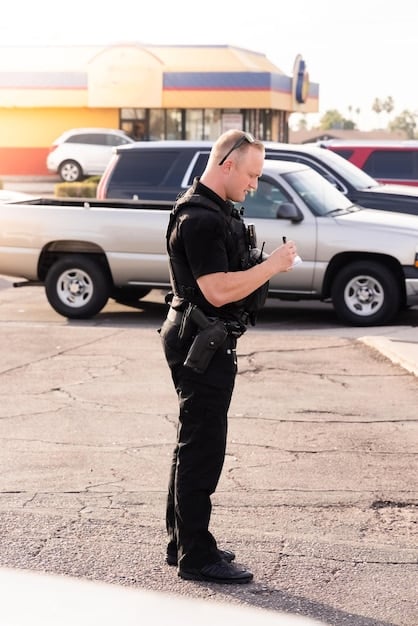Know Your Rights: A Guide to Traffic Stops and Civil Rights in the US

Understanding your rights during a traffic stop is crucial to avoiding civil rights violations. This guide outlines your rights and provides practical tips for ensuring your safety and protecting your freedoms during encounters with law enforcement in the United States.
Being pulled over by law enforcement can be a stressful experience. Understanding **what are your rights during a traffic stop? A guide to avoiding civil rights violations** is crucial to protect yourself and ensure fair treatment.
Understanding Your Fourth Amendment Rights
The Fourth Amendment to the U.S. Constitution protects individuals from unreasonable searches and seizures. This protection extends to traffic stops, meaning that police officers must have a legitimate reason to stop you.
This section will delve into the specifics of what constitutes a lawful traffic stop and what your rights are under the Fourth Amendment.
Reasonable Suspicion
For a traffic stop to be legal, a police officer must have reasonable suspicion that a traffic violation has occurred or is about to occur. This suspicion must be based on specific and articulable facts, not just a hunch.
Probable Cause
In some cases, an officer may need probable cause, a higher standard than reasonable suspicion. Probable cause means that there is sufficient evidence to believe that a crime has been committed.
- Right to Remain Silent: You have the right to remain silent and not answer questions.
- Right to Refuse a Search: You generally have the right to refuse a search of your vehicle unless the officer has probable cause or a warrant.
- Right to an Attorney: You have the right to consult with an attorney.

Understanding these rights is the first step in protecting yourself during a traffic stop. Knowing your rights can help you to remain calm and assertive, and to avoid unintentionally incriminating yourself.
How to Conduct Yourself During a Traffic Stop
Your behavior during a traffic stop can significantly impact the outcome of the encounter. Remaining calm and respectful is crucial, even if you believe the stop is unjustified.
This section provides practical tips for how to interact with law enforcement officers during a traffic stop, emphasizing the importance of staying calm and assertive.
Stay Calm and Respectful
Maintaining a calm demeanor can de-escalate the situation and prevent misunderstandings. Regardless of your feelings about the stop, remain respectful towards the officer.
Provide Required Documents
You are generally required to provide your driver’s license, registration, and proof of insurance upon request. Have these documents readily available to avoid delays or suspicion.
- Communicate Clearly: Speak clearly and avoid making sudden movements.
- Keep Hands Visible: Keep your hands visible at all times, preferably on the steering wheel.
- Avoid Arguments: Avoid arguing with the officer, even if you disagree with their assessment.
Following these guidelines can help ensure a smoother and more respectful interaction with law enforcement. Remember, your goal is to resolve the situation peacefully and without escalating tensions.
When Can an Officer Search Your Vehicle?
One of the most critical aspects of traffic stops is understanding when an officer is legally allowed to search your vehicle. Generally, an officer needs probable cause or your consent to conduct a search.
This section explains the circumstances under which an officer can legally search your vehicle, including the plain view doctrine and when consent is valid.
Probable Cause
If an officer has probable cause to believe that your vehicle contains evidence of a crime, they can search your vehicle without your consent. This might include seeing illegal drugs or weapons in plain view.
Consent
You have the right to refuse a search of your vehicle. However, if you voluntarily consent to a search, the officer can proceed even without probable cause.
- Plain View Doctrine: If illegal items are visible in plain view, the officer can seize them and conduct a search.
- Search Incident to Arrest: If you are being arrested, the officer can search your vehicle as part of the arrest.
- Exigent Circumstances: If there is an immediate threat to public safety, the officer can search your vehicle without a warrant.

Knowing when an officer can legally search your vehicle is crucial to protecting your Fourth Amendment rights. Always remember that you have the right to refuse a search unless the officer has probable cause or a warrant.
Documenting the Traffic Stop: What to Record
In today’s digital age, documenting a traffic stop can be a valuable way to protect your rights. Recording the encounter, whether through video or notes, can provide an accurate account of what occurred.
This section explores the best methods for documenting a traffic stop, including the use of audio and video recording, and the importance of detailed note-taking.
Audio and Video Recording
Many states allow you to record police officers in public, including during a traffic stop. Inform the officer that you are recording, if possible, and ensure your device is visible.
Detailed Notes
If you cannot record, take detailed notes as soon as possible after the stop. Include the date, time, location, officer’s name, badge number, and a detailed description of the encounter.
Documenting the traffic stop can provide valuable evidence if you believe your rights were violated, but always be aware of local laws and regulations regarding recording police interactions to avoid legal issues.
Filing a Complaint: When and How to Take Action
If you believe your civil rights were violated during a traffic stop, you have the right to file a complaint. This process involves gathering evidence and submitting a formal complaint to the appropriate authorities.
This section outlines the steps involved in filing a complaint, including identifying the relevant authorities, gathering supporting evidence, and understanding the potential outcomes.
Identify the Relevant Authorities
Determine the appropriate agency to file your complaint with. This could be the police department’s internal affairs division, a civilian review board, or a state or federal civil rights agency.
Gather Supporting Evidence
Collect any evidence you have, such as videos, photos, witness statements, and your own notes. The more evidence you can provide, the stronger your case will be.
Filing a complaint is an important step in holding law enforcement accountable for their actions and ensuring that your rights are protected. Be prepared to provide detailed information and evidence to support your claim.
State Laws and Your Rights
Traffic stop laws can vary by state, so it’s essential to understand the specific laws in your area. Knowing your state’s laws can help you better protect your rights during a traffic stop.
This section highlights the importance of understanding state-specific traffic laws and how they can impact your rights during encounters with law enforcement.
Variations in Traffic Laws
Some states have stricter laws regarding sobriety checkpoints, while others have broader protections against unreasonable searches. Research your state’s specific regulations.
Know Your State’s Laws
Stay informed about the laws in your state to ensure you know your rights and responsibilities during a traffic stop. This knowledge can empower you to assert your rights effectively.
Understanding your state’s traffic laws is a key component of protecting your civil rights during traffic stops. Stay informed, and be prepared to assert your rights if necessary.
| Key Point | Brief Description |
|---|---|
| ✋ Right to Silence | You don’t have to answer questions beyond providing ID, registration, and insurance. |
| 🚫 Refuse Search | Politely decline a vehicle search unless there’s probable cause or a warrant. |
| 🎥 Document | Record the encounter if possible, and take detailed notes afterward. |
| ⚖️ File Complaint | If violated, file a complaint with the appropriate authorities, providing evidence. |
FAQ
▼
Pull over to a safe location, turn off the engine, turn on your interior lights, and place your hands on the steering wheel. Inform the officer if you need to reach for any documents.
▼
Many states allow you to record police in public, but it’s essential to know your local laws. Inform the officer you are recording, if feasible, and keep your device visible.
▼
Remain calm and comply with the officer’s instructions. Document everything and consult with an attorney as soon as possible to discuss your options.
▼
You are generally required to provide your driver’s license, registration, and proof of insurance. You have the right to remain silent and not answer other questions.
▼
Probable cause may include visible evidence of a crime, such as illegal drugs or weapons in plain view, or a reasonable belief that the vehicle contains evidence of a crime.
Conclusion
Understanding your rights during a traffic stop is crucial for protecting your civil liberties. By staying informed, remaining calm, and knowing your options, you can navigate these encounters with confidence and ensure that your rights are respected.





